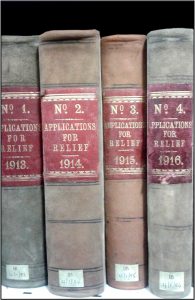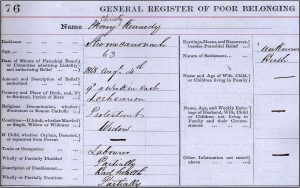What are Poor Relief Records?
 The Poor Law Amendment (Scotland) Act of 1845 established Parochial Boards (later Parish Councils) in each parish. They administered funds for the poor, gradually removing the responsibility from the church. Those who were unable to support themselves were eligible to apply for help. This included the elderly, the young and those with a mental or physical disability (including pregnancy). Records include Applications for Relief, Parochial Board Minute Books and General Registers of Poor.
The Poor Law Amendment (Scotland) Act of 1845 established Parochial Boards (later Parish Councils) in each parish. They administered funds for the poor, gradually removing the responsibility from the church. Those who were unable to support themselves were eligible to apply for help. This included the elderly, the young and those with a mental or physical disability (including pregnancy). Records include Applications for Relief, Parochial Board Minute Books and General Registers of Poor.
What dates do they cover?
Dates vary for each parish depending on what records (if any) have survived. Where complete sets of records survive they can date from 1845-1930, when the Parish Councils were abolished.
 What can I use them for?
What can I use them for?
- To trace someone in the Highlands shown on a death certificate or census as ’pauper’
- to understand provision for the poor in the past
- to learn about the development of the welfare state
- to find an ancestor whose death certificate shows a Highland Poorhouse as place of death
- to look for an illegitimate child (single mothers often claimed for help)
What will they tell me?
 Applications for Relief record requests for assistance and include details of the applicant. These include Name, Age, Marital Status, Occupation, Nature of Disability and the result of the application.
Applications for Relief record requests for assistance and include details of the applicant. These include Name, Age, Marital Status, Occupation, Nature of Disability and the result of the application.
The Parochial Board Minute Books detail the debate about whether relief should be granted.
The General Register of Poor lists people whose applications were successful for In Relief (in the Poorhouse) or Out Relief (money given in their own home). It contains detailed information about the applicant, lists all help given and records the nature of settlement. Entitlement could be claimed through birth, marriage or long-term residency in a parish.
Will there definitely be useful information in there?
 If you’re researching a person described as a ‘pauper’ you are likely to find them in the Parochial Board/Parish Council records, if the records have survived. If you’re trying to find details of an illegitimate child there is no guarantee that the child will appear in the records. However, they are an essential place to try. If you’re researching Highland welfare provision these records will provide you with useful information. You will also gain an insight into the Poor Law system.
If you’re researching a person described as a ‘pauper’ you are likely to find them in the Parochial Board/Parish Council records, if the records have survived. If you’re trying to find details of an illegitimate child there is no guarantee that the child will appear in the records. However, they are an essential place to try. If you’re researching Highland welfare provision these records will provide you with useful information. You will also gain an insight into the Poor Law system.
Do I need to know anything first?
If you’re researching a person, any information you have will be useful in finding him/her. If you’re researching a particular subject it’s up to you where you start!
Are there any viewing restrictions?
Yes – due to the sensitive information contained within Poor Law records they are closed for 100 years.
Can I have photocopies?
Yes. Charges may apply.
Can I take photographs?
Yes. Charges may apply.
Where can I find out what you hold?
The holdings for each Parochial Board/Parish Council are listed in our searchroom catalogues.
Where do I go next?
If you’re researching a person claiming relief in the 1800s why not try earlier church records to see if his/her name appears there? If you find a person who was admitted to a Poorhouse we also hold the records of some Poorhouses. If you’re researching Highland welfare provision try the Highland Health Board collection.
Find out more about the other types of records held by the Highland Archive Service.
